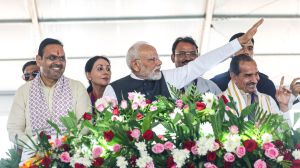US attack on Iran not on agenda now: Rice
Secretary of State Condoleezza Rice began her first foreign tour as America’s top diplomat by saying on Friday that Washington had no i...

Secretary of State Condoleezza Rice began her first foreign tour as America’s top diplomat by saying on Friday that Washington had no immediate plans to attack Iran and was pursuing a diplomatic approach.
‘‘The question is simply not on the agenda at this point —— we have diplomatic means to do this,’’ she said when asked in London if Washington was considering military action to force compliance from Tehran on its nuclear programme.
Her response, assuaging fears of imminent military action, though leaving the door open for the future, was unlikely to reduce global tensions over Iran, which President George W. Bush this week called the ‘‘world’s primary state sponsor of terror.’’
Rice, who later flew to Berlin, hopes to use her week-long tour of Europe and the Middle East to heal transatlantic ties after the war in Iraq and launch a new push for Middle East peace.Rice insisted the Middle East conflict was high on the US agenda. She reiterated US offers to help train Palestinian security forces and hailed a shift in mood under new Palestinian President Mahmoud Abbas, whom she meets on Monday.
Reform was sweeping through the Middle East, she said in a speech littered with references to the US push for ‘‘liberty’’. ‘
‘Iran is not immune to the changes that are going on in this region,’’ she added, referring to recent elections in Afghanistan and Iraq.
Three EU countries are trying to engage and negotiate with Iran to ensure it does not develop nuclear weapons, but the United States has preferred a tactic of confronting and isolating it.
Rice said Iran, branded by Washington as part of an ‘‘axis of evil’’ with pre-war Iraq and North Korea, needs to live up to its obligations and agree to inspections of nuclear facilities.‘‘It is the Iranians that are isolated on this issue —— not the United States,’’ she said, lambasting the Islamic republic’s ‘‘abysmal human rights record.’’
Explaining a hardening of the US stance towards Iran this year, a State Department official said: ‘‘The President and the Secretary (of State) have made more explicit that we support the aspirations of the Iranians to control their own government’’. —Reuters




- 01
- 02
- 03
- 04
- 05


























